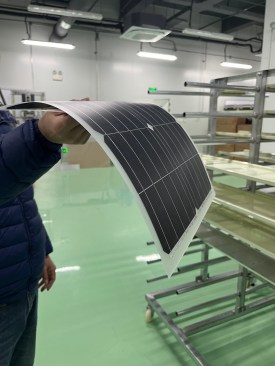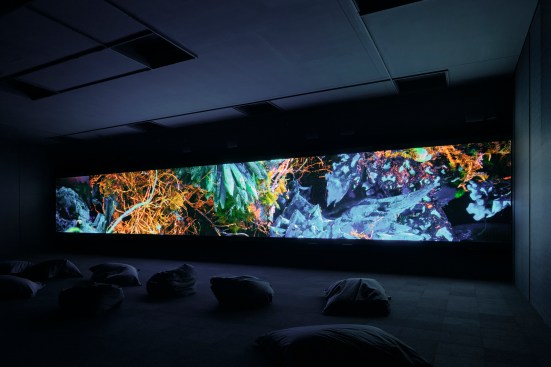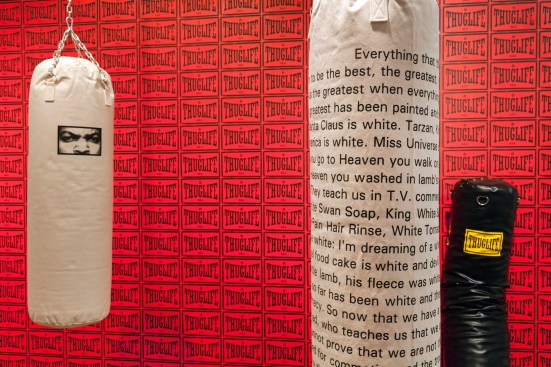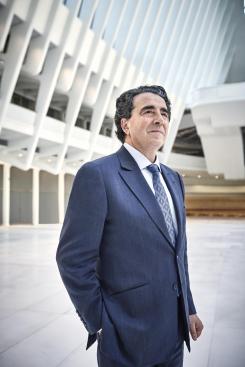
courtesy Wenzhu Liu
Flexible solar panel
Flexible Solar Panels
Conventional, crystal silicon–based solar panels are typically used on flat surfaces so they don’t crack. However, according to new research published in Nature last month, it’s possible to create solar cells that can bend and curl into themselves without losing their functionality. Researchers Wenzhu Liu, Yujing Liu, Ziqiang Yang, Changqing Xuat—and a team of their colleagues at the University of Chinese Academy of Sciences in Beijing—have developed thin, bendable solar cells that use similar silicon-based internals as traditional cells, yet are 95% lighter. This discovery could open the door for architects and designers to incorporate energy-efficient solar panels into their buildings without compromising design or aesthetics. [Nature]
Google Earth Engine and Deforestation Research
Protecting the Amazon, the largest rainforest in the world, from deforestation presents many complex challenges. Google Earth Engine, a geospatial processing resource for researchers and public policy experts, has made initiatives like these easier to tackle. Before its inception in 2010, maps and satellite images would be physically or digitally cataloged by various institutions such as NASA or research universities. And to gather information, researchers would have to spend lots of time and money sourcing what they needed for their projects. “Google Earth Engine changes this paradigm,” Gilberto Câmara, a computer scientist and former director of Brazil’s National Institute for Space Research, said in an article published by The Verge. “Instead of the data going to where the software is, which is your computer, the software goes to where the data is, which is Google.”
In the article, Marcos Rosa—the technical coordinator at MapBiomas, a Brazilian nonprofit that aids in sustainable management and natural resource conservation—says technology has made it possible to remotely monitor, and ultimately protect, some of the world’s most intricate biomes. “A number of advancements have made that possible—including free access to satellite imagery and better internet access around the world—but a key piece of that is the cloud computing and power to analyze satellite images using Google Earth Engine,” Rosa said in the article. Still, a caveat remains: If, one day, Google discontinues this service, the research community’s ability to gather geospatial data could suffer a massive blow . [The Verge]
Canadian Wildfires, Smoke Pollution, and Climate Change
Smoke pollution from hundreds of wildfires across 11 provinces and territories in Canada has traveled to several cities and states in the northern U.S., with New York, in an Instagram video above, experiencing hazy, orange-grey skies last week. Since March, upward of nine million acres have burned in Canada. According to an article published by New Scientist, these fires released a record amount of carbon into the atmosphere in May—the highest levels since the Canadian fires in May 2019—which is considered early for fire season in North America. Hotter and drier conditions as a result of human-led climate change may lead to more intense fires in the years to come. [New Scientist]
An Enduring Design by Frank Gehry

courtesy AIA
As seen from above, the Guggenheim Museum Bilbao by Gehry Partners
The American Institute of Architects has awarded the Guggenheim Museum Bilbao in Spain its 2023 Twenty-Five Year Award, which recognizes “a building that has set a precedent for the last 25–35 years and continues to set standards of excellence for its architectural design and significance,” according to an AIA press release.
“That the Guggenheim Bilbao is still relevant and is still working for the artists and visitors and the city means we did something right,” the building’s architect, Frank Gehry, FAIA, tells ARCHITECT. “I just went back for the 25th anniversary, and the town was alive—so different from when I first started visiting in the ‘90s.” [ARCHITECT]
An Artist’s Take on Deforestation

Tom Ross
Richard Mosse, Broken Spectre, 2018–2022. Four channel video installation with 12.2 surround sound, 74 minutes and 11 seconds. Produced in Brazil and Ecuador. Installation view, NGV
To celebrate the opening of its new exhibition space, 1201 Minnesota Street, the Minnesota Street Project Foundation—in partnership with the San Francisco Museum of Modern Art and the art gallery Altman Siegel—will present artist Richard Mosse’s large-screen, multi-channel video installation, Broken Spectre, for the first time in the United States now through June 30.
“For decades, scientists have harnessed advanced forms of remote sensing photography to understand the forest’s degradation, model tipping points, and reveal impending environmental catastrophe underway in the Amazon,” Richard Mosse said in a press release. “Broken Spectre, which I made in collaboration with cinematographer Trevor Tweeten and composer Ben Frost, is a disquieting portrait of willful environmental catastrophe along the Trans-Amazonian Highway told through a kaleidoscope of scientific, cultural, historic, socio- political, activist, and anthropological filters.” [New York Times]
Sound as Art

Carlos Avendaño
Glenn Ligon, in collaboration with The Fabric Workshop and Museum, Philadelphia. Skin Tight (ThuglifeII) (installation view), 1995.
Later this month, The Fabric Workshop and Museum in Philadelphia will open a new exhibition entitled Sonic Presence (or Absence): Sound in Contemporary Art featuring 22 artists and makers who explore sound as an art form. Artist Nick Cave, for example, will show “Soundsuit,” an ensemble made of stuffed animals that plays with the notion of clothing oneself in sound. Pictured above is “Skin Tight” by Glenn Ligon. The artist has compiled eight punching bags set before a backdrop of graphic wallpaper that reflect on ideologies of Black masculinity. The installation, which features images of rappers such Ice Cube and words from Muhammad Ali, hopes to empower viewers to examine the impacts, implications, and sounds of activating a punching bag.
The exhibition was curated by the museum’s former exhibitions manager, Alec Unkovic, and will be on view from June 23 to Jan. 7, 2024. [The Fabric Workshop and Museum]
Santiago Calatrava to Receive Lifetime Achievement Award

Thomas Hoeffgen
Santiago Calatrava
The Florence Biennale has announced that Spanish architect Santiago Calatrava will receive its second Leonardo da Vinci Lifetime Achievement Award during its 14th design event, themed “I Am You – Individual and Collective Identities in Contemporary Art and Design,” from Oct. 14–22 in Florence, Italy. “The prize is the Florence Biennale’s tribute to one of the most influential architects of our times, and a recognition of [his] audacious experimentation, extraordinary talent, and ingenious ability to combine architecture and art in projects imagined and designed in harmony with nature and oriented towards the ideals of beauty,” the organization said in an announcement on its website. As guest of honor at the biennale, Calatrava will also have an exhibition inside the Cavaniglia Pavilion, located on-site at the event. [Florence Biennale]
Looking for more tech and culture news? We’ve got you covered.
